
Artist Pop-Up Sale


Paintings Sculpture Drawings Prints

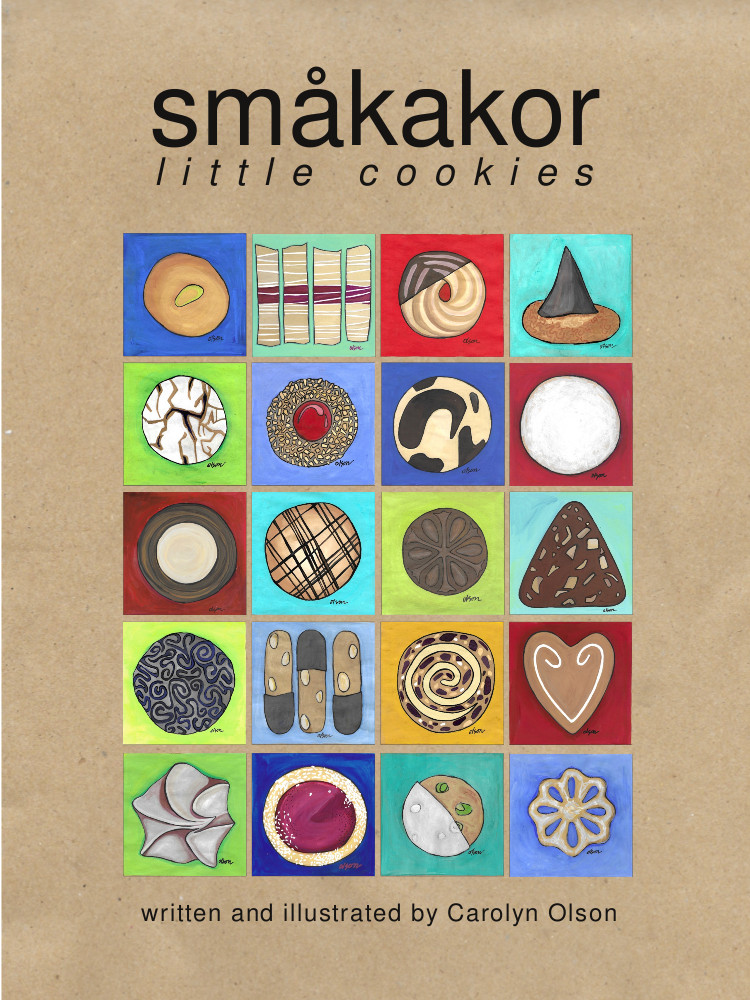
Are you looking for a fun holiday card with a cookie on the front, blank inside with white envelopes?? Perfect.
4 1/8″ x 5 7/8″ (blank inside with white envelopes) available. Sold in sets of 25 for $125. Up to 5 different cookies available/set. 2 weeks for delivery (Duluth area)
Select this link to see all the little cookies.

November 4 – January 4, Zeitgeist Atrium Gallery, Duluth, MN. Opening event Wednesday, November 5th, 5-7pm
March 6 – April 24, MacRostie Art Center, Grand Rapids, MN. Opening event March6, 4-7pm
For the last year I have been working on this body of work. The stories of mutual aid and chosen family are important to retell now more than ever. We’re reminded that we aren’t alone, that our families and community need us as much as we need them. We stay connected to the good – reject the chaos. We bring our best to each day and make the world better.
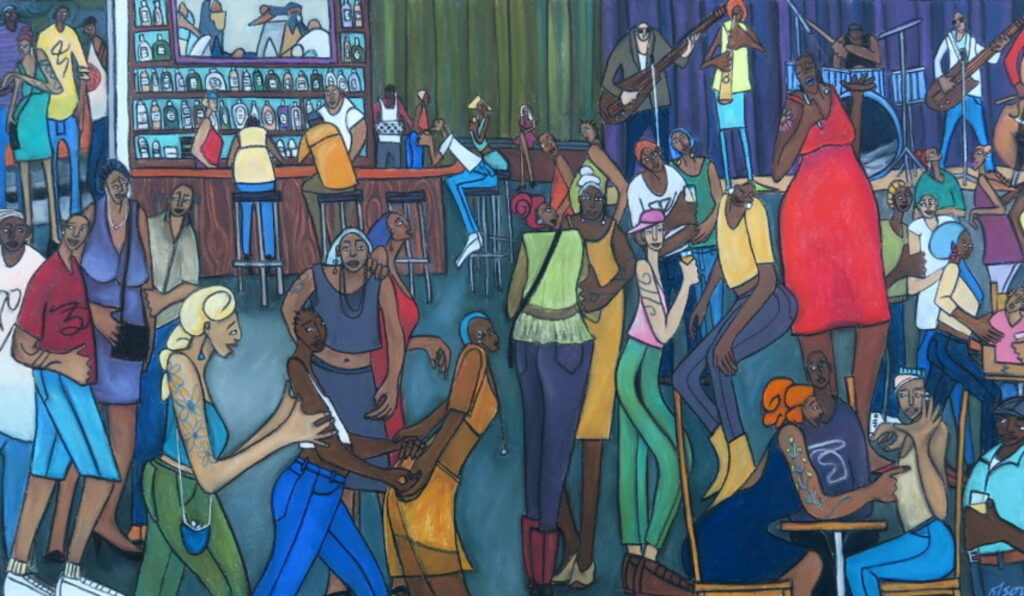
Carolyn Olson is a fiscal year 2025 recipient of a Creative Individuals grant from the Minnesota State Arts Board. This activity is made possible by the voters of Minnesota through a grant from the Minnesota State Arts Board, thanks to a legislative appropriation from the arts and cultural heritage fund.
This activity is made possible in part through an Artist Equity Grant from the Arrowhead Regional Arts Council, thanks to generous support from the McKnight Foundation.


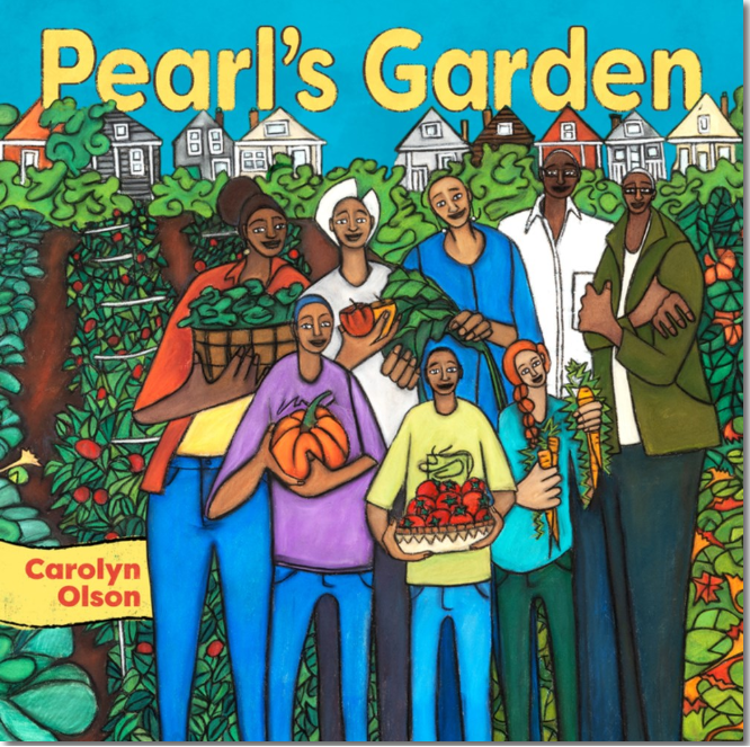
“Pearl’s Garden” is the story of young person wanting to grow a vegetable garden in their urban back yard. With the help of community and family they are able to produce food to share. It is a hopeful story of how to work together and help each other as we can to achieve our goals.
Pre-orders are available through the MNHS Press or through your local book stores.
A collaboration between Zeitgeist and the Duluth Transit Authority working collaboratively to bring public art to bus shelters in support of “National Day Without Driving”. Art wraps will be installed permanently creating an inclusive positive space.
Each shelter depicts a different season with an inclusive group of folks waiting for the bus to arrive. I am thrilled to be a part of this effort. Public art is one of my passions. Making transportation welcoming and available to everyone is who we need to be as a community.
These four drawings will eventually be at 13th Ave E. and Superior St./Duluth transit shelters. Thanks to Zeitgeist and the DTA for the opportunity!
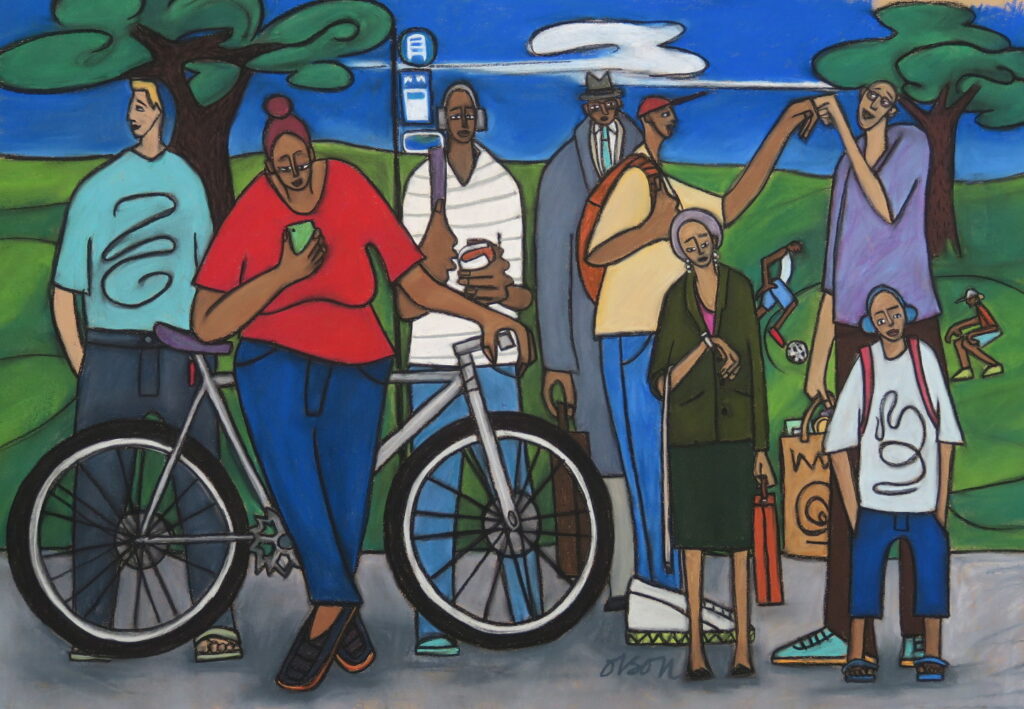
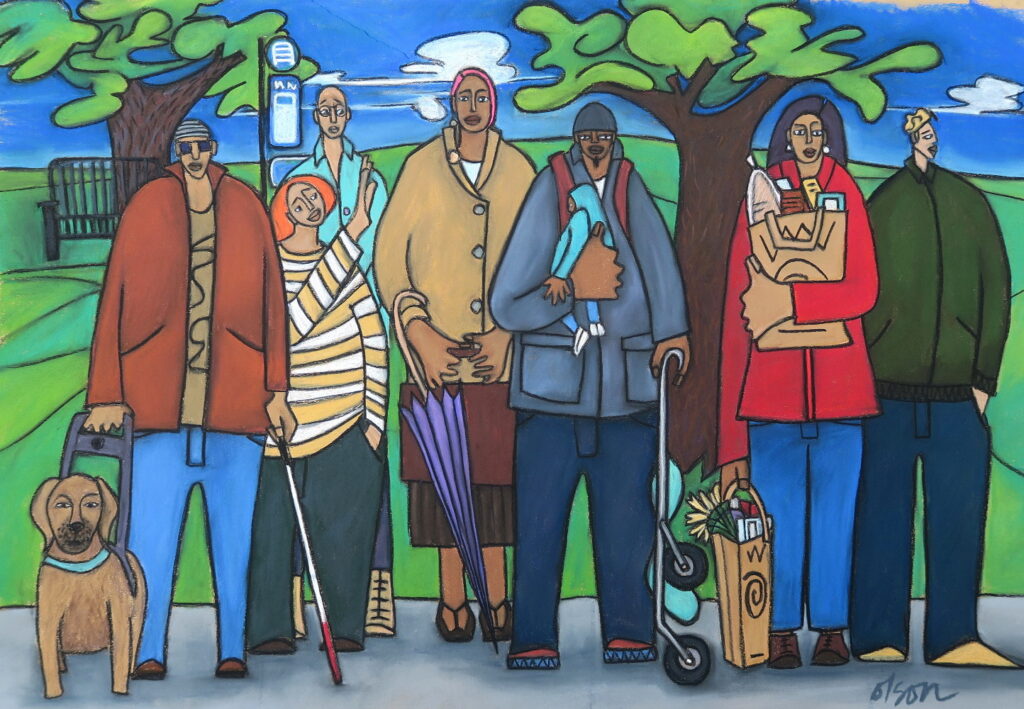
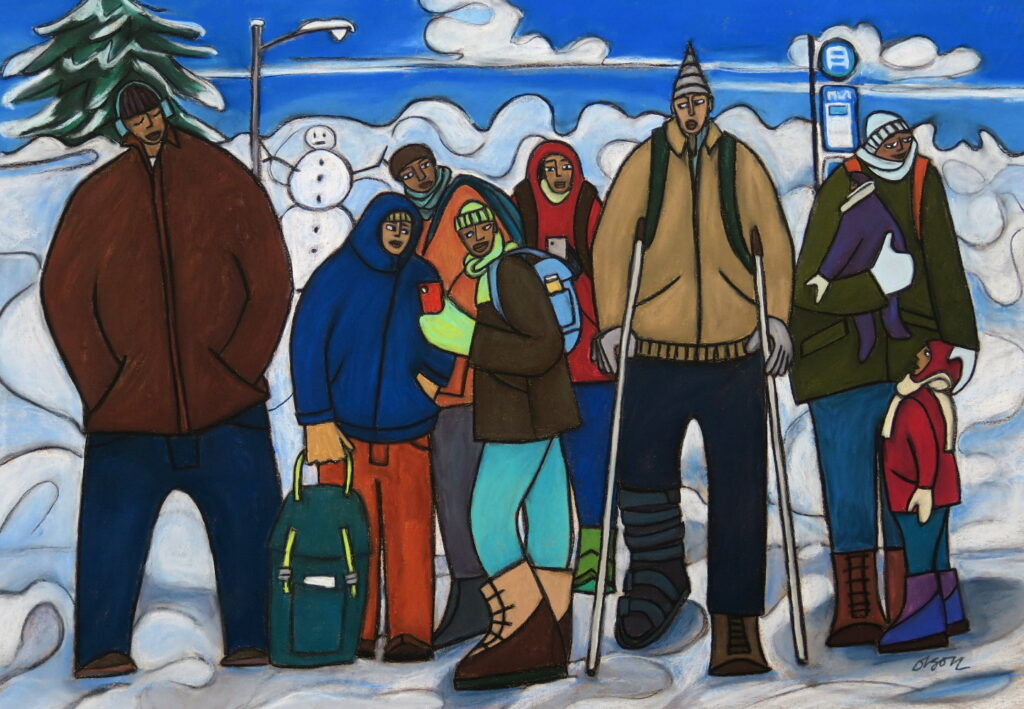
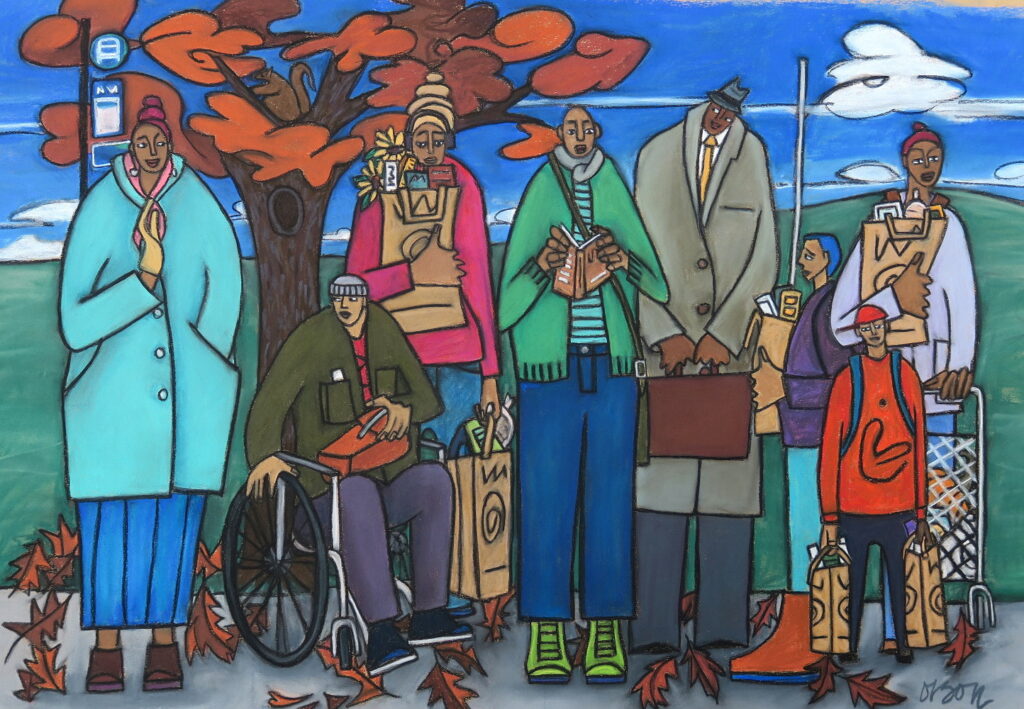

Get ready for the holiday with pepparkakor cookies! Hearts and Emigrants.. Unless you’re Native American we are all emigrants.
Holiday card set available – 25 cards with blank inside and white envelope $100 includes tax and shipping cost. Allow 3-4 weeks for delivery.
(Lois Bersell Olson) Pepparkakor recipe:
1/2 c butter
2/3 c brown sugar
1/3 c honey
1 egg
2 c flour
1/2 tsp baking soda
1/2 tsp salt
1 tsp coriander
1/8 tsp cinnamon
Mix all together. Chill. Roll out to 1/8” thick and cut out with shapes. Bake at 375 degrees F for 5-7 minutes. Makes 4 dozen

Choose your favorite cookie on a blank card to send to a friend (who probably loves the same cookie as you!!
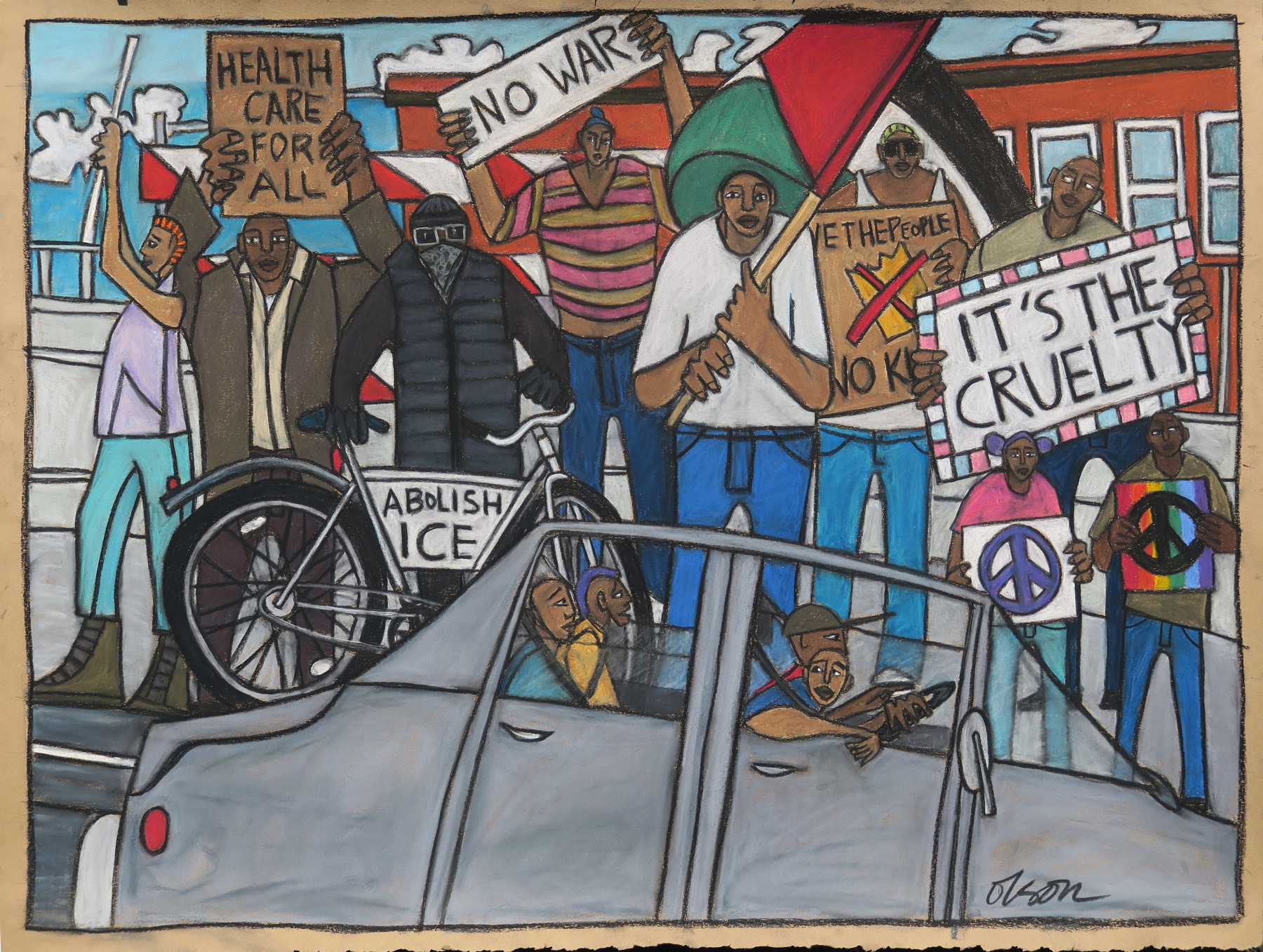
Art as resistance refers to the use of artistic expression to challenge, critique, and confront social, political, or cultural norms, often with the aim of sparking change or raising awareness about injustices.
Examples include: spontaneous street art and graffiti created in protest to the killing of George Floyd, Dante Wright, Breanna Taylor and others; Black Lives Matter murals, music and performances; Anti-apartheid murals as powerful visual statements opposing the racist regime; and Anti-war paintings by Picasso and Goya as well as and street art by Banksy just to name a few.
Know that art has been used by dictators and fascist regimes against us as well to maintain control. Examples include: WWII’s Nazi Germany’s graphic propaganda with swastikas’ and “Aryan ideals” which opposed modern art (Bauhaus) and expression. Their excessive pageantry created a false narrative of community support for their cruel policies; the Soviet Union glorifying cruel leaders like Stalin while silencing dissenting artists and communities who chose to speak out against the regime; and Mao in China used powerful graphics to reinforce loyalty to the communist party/Mao
Its important to know the key ways they employ art to maintain power: Dictators establish and maintain their authority through a carefully cultivated image of being powerful, infallible leaders. This is often achieved through widely circulating portraits, statues, and symbols of the leader to reinforce their authority and deify them. Creating monumental public buildings and monuments that convey a sense of grandeur, strength, and the regime’s dominance. Art is used to rewrite history, presenting a version that aligns with the regime’s narrative and justifies its actions. Authoritarian regimes tightly control artistic expression, promoting only the art that aligns with their political agenda and suppressing any forms or artists deemed subversive. Artists who resist face severe consequences like persecution, censorship, or worse.
Remember that art can also be a powerful tool for resistance against oppressive regimes. Artists often find ways to subtly embed messages of dissent or critique within their work, even under strict censorship. This can involve using allegory, metaphor, and other forms of symbolism to convey subversive meanings. Art, in this context, becomes a vital means of resistance, resilience, and maintaining individual autonomy. (Ms. Google)
I have found drawing a way to deal with anxiety about the fascist regime currently running our country. Join me in speaking up for our family and neighbor’s. Stay safe. Stay strong.
Mutual aid is where people in an area, or a community, come together to support one another, collectively meeting each other’s needs without the help of official bodies like the state or NGOs. It often arises due to neglect of government provision for certain classes of people.
Mutual aid, in simpler words, is cooperation for the common good.
Mutual aid is a horizontal mode of organization, aiming to break down hierarchies and practice collective decision making. However, the concept of mutual aid encompasses a wide variety of practices – there is no one-catch-all term or definition, it is a universal practice rather than a singular concept. All of the examples listed on this site attempt to speak to the universality of this practice, but by no means aim to define them rigidly.The idea of solidarity, rather than charity, underpins mutual aid. Resources are unconditionally shared, as opposed to charity which is often conditional and means tested.
Mutual aid has been around for a while. Dean Spade, a trans activist and scholar defines mutual aid as, “work that directly addresses the conditions the movement seeks to address, such as providing housing, food, health care, or transportation in a way that draws attention to the politics creating need and vulnerability.” In other words, mutual aid is solidarity not charity.
Mutual aid groups have been around through every corner of U.S. history in the form of unions, activist groups, and organized networks. Spade notes that some of the most famous examples of mutual aid in the US are from the l960s and 1970s. The Black Panthers’ free breakfast program fed tens of thousands of Black children and ultimately helped contribute to the establishment of federal free lunch programs. In 1970, the Young Lords took over the sixth floor of Lincoln Hospital and fought to provide medical care and testing to neglected communities in the predominantly Black and Latinx South Bronx. And before Roe v. Wade legalized abortions, a group of women in Chicago helped 11,000 women access abortions.
https://www.theegayagenda.com/mutual-aid
https://www.mutualaid.coop/what-is-mutual-aid/


The Free Breakfast for School Children Program, or the People’s Free Food Program, was a community service program run by the Black Panther Party that focused on providing free breakfast for children before school. The program began in January 1969 at Father Earl A. Neil’s St. Augustine’s Episcopal Church, located in West Oakland, California and spread throughout the nation. This program was an early manifestation of the social mission envisioned by Black Panther Party founders Huey P. Newton and Bobby Seale, along with their founding of the Oakland Community School, which provided high-level education to 150 children from impoverished urban neighborhoods. The breakfasts formed the core of what became known as the party’s Survival Programs.[2] Inspired by contemporary research about the essential role of breakfast for optimal schooling and the belief that alleviating hunger and poverty was necessary for Black liberation, the Panthers cooked and served food to the poor inner city youth of the area. The service created community centers in various cities for children and parents to simultaneously eat and learn more about black liberation and the Black Panther Party’s efforts. (Wikipedia)

“Laundry Love” is a national organization dedicated to providing laundry services to people with low and no incomes. Our local chapter in Duluth, MN is now in full swing offering free laundry services once a week. Volunteers staff Spin City (Spirit Valley) laundromat for three hours at a time, offering people the chance to wash up to two loads of clothes per week. Laundry Love volunteers provide snacks and activities as well, hoping that this service is more than just a place to clean your clothes, but an opportunity to build and celebrate community.

Brake Light Repair Clinics are events where organizers change people’s broken tail lights for free in order to to reduce police interactions and have discussions with people about their personal experiences with police.
More than 50,000 drivers are pulled over in a traffic stop every day in the U.S., according to the Stanford Open Policing Project. Reports document black folks being pulled are over 20 percent more likely to get a ticket than white drivers, underlining the stark racial disparities within the criminal justice system.
The process for fixing brake lights is simple, but will help in reducing community interactions with police and help educate the community on legislation that activists are interested in passing.
Brake Light Clinic impact our communities by reducing the number of police interactions working-class people encounter due to bogus reasons such as broken brake lights and building relationships with our neighbors!